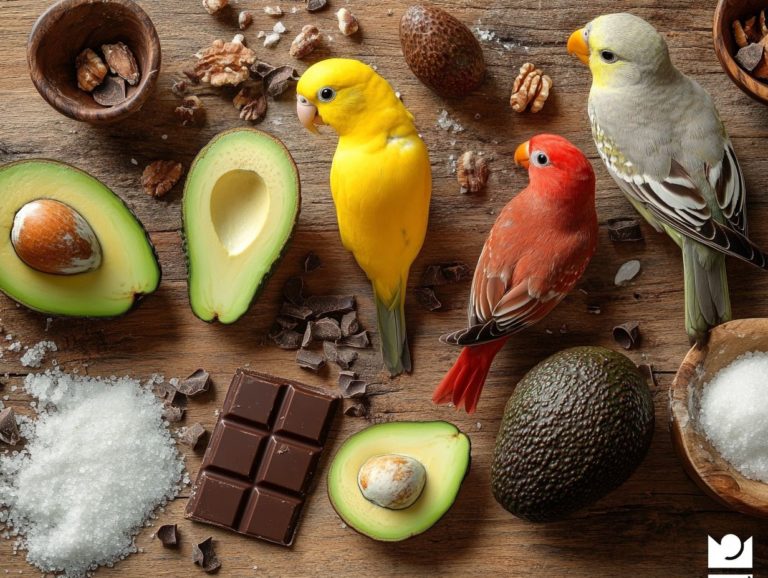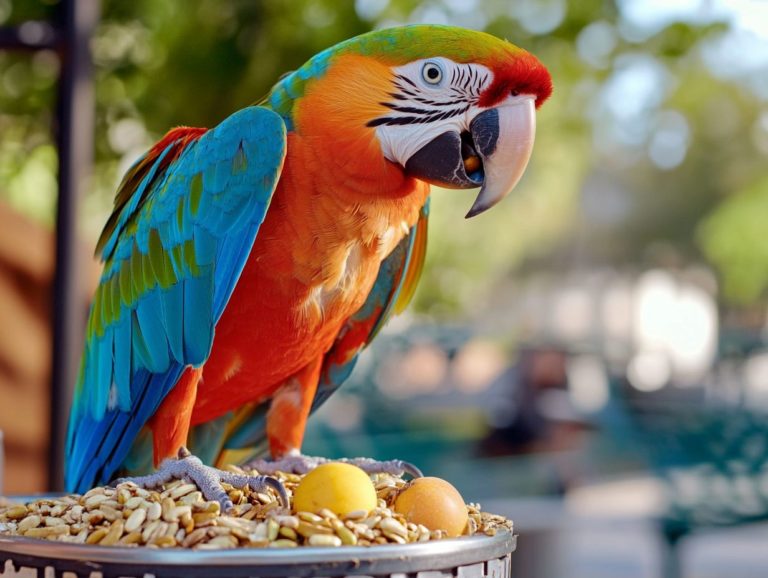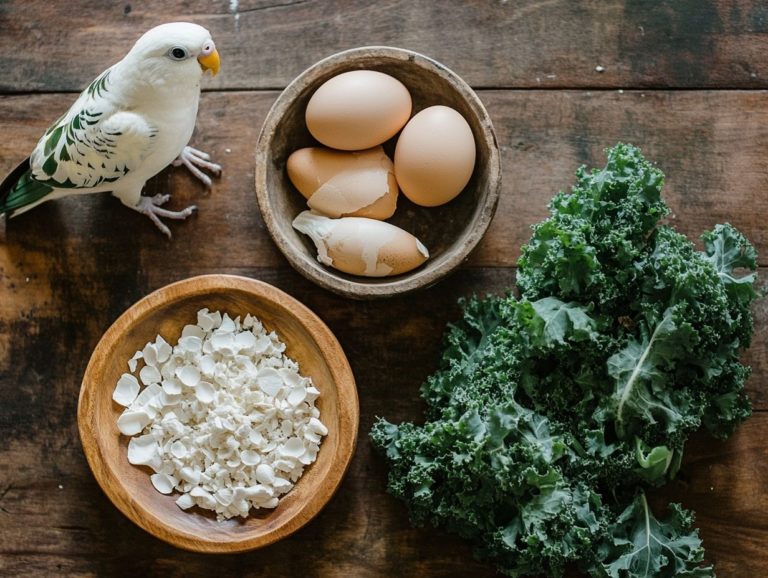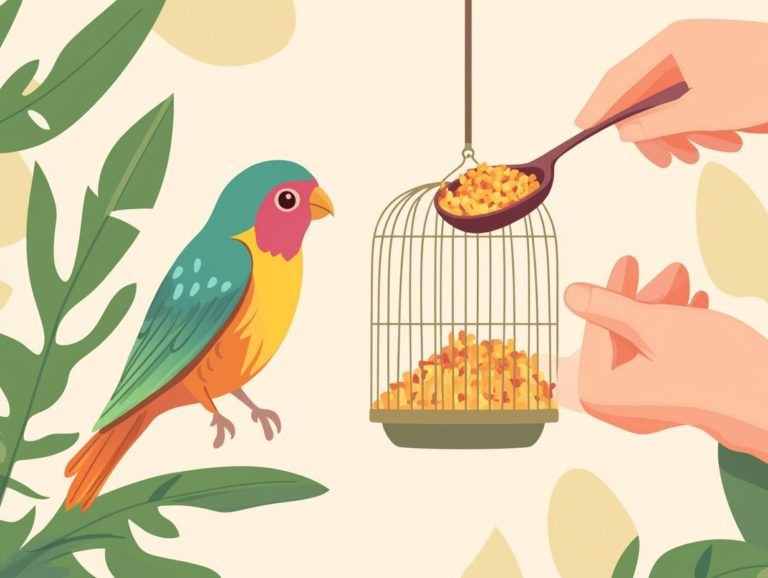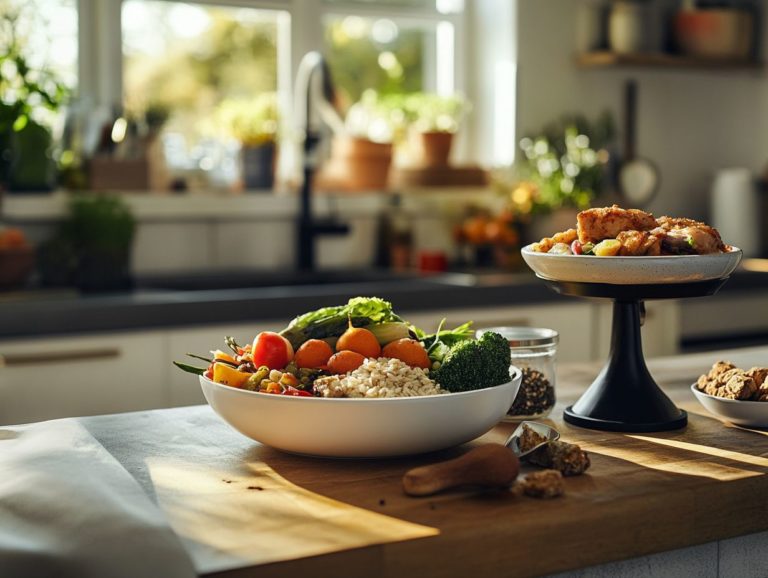5 Favorite Foods of Pet Birds
A well-balanced diet is essential for the health and happiness of your pet bird.
This article delves into five favorite foods that will help your feathered companion thrive. From nutrient-rich seeds and nuts to vibrant fresh fruits and vegetables, each option plays a crucial role in your bird s diet.
You’ll also find insights on what to avoid, how to introduce new foods, and the profound impact of diet on overall health.
Uncover the secrets to keeping your pet bird healthy and content!
Contents
- Key Takeaways:
- 1. Discover the Power of Seeds and Nuts
- 2. Fresh Fruits and Vegetables
- 3. Cooked Whole Grains
- 4. Pellets
- 5. Treats and Supplements
- What Should Be Avoided in a Pet Bird’s Diet?
- Frequently Asked Questions
- What are the top 5 favorite foods of pet birds?
- Do all pet birds have the same favorite foods?
- Can I feed my pet bird human food as one of their favorite foods?
- How can I introduce new foods to my pet bird’s diet?
- Are there any foods that pet birds should not eat?
- Should I offer my pet bird a variety of foods or stick to their top 5 favorites?
Key Takeaways:
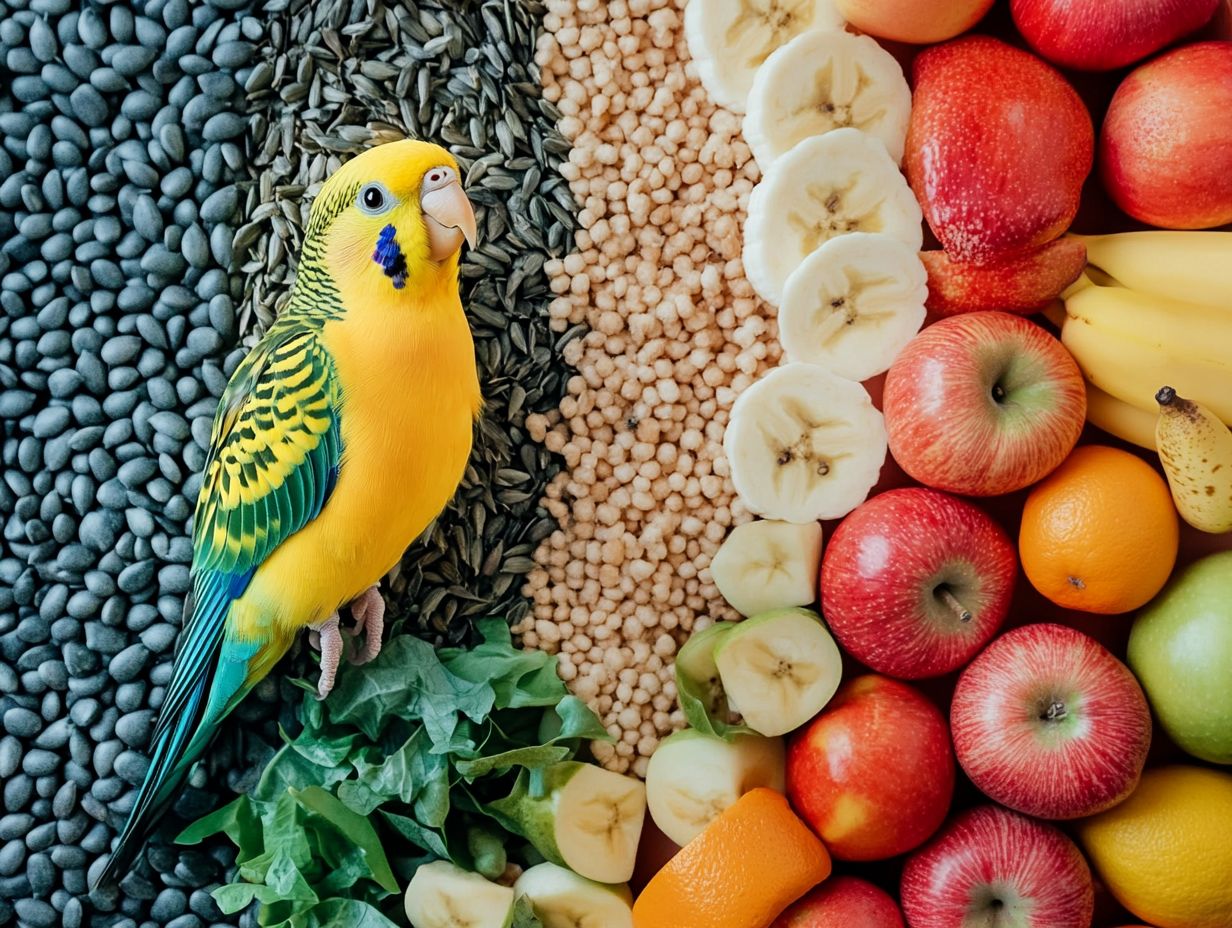
- Seeds and nuts provide essential proteins and healthy fats for pet birds.
- Fresh fruits and vegetables offer a variety of vitamins and minerals for a well-rounded diet.
- Cooked whole grains are a great source of carbohydrates and fiber for pet birds.
1. Discover the Power of Seeds and Nuts
Seeds and nuts are essential players in the diet of pet birds, especially for species like parrots. However, incorporating vegetables is equally important, as they offer health benefits for pet birds that provide protein, healthy fats, and a range of nutrients necessary for their overall health and well-being.
A balanced diet featuring high-quality seeds and nuts enhances bird health and nurtures the joyful bond between you and your feathered companion. This nourishment ensures they have the energy required for their playful antics and explorations.
Consider incorporating some standout options, such as sunflower seeds, which are rich in Vitamin E and known to promote vibrant feathers. Almonds and walnuts also shine as excellent sources of Omega-3 fatty acids.
However, moderation is key; offering these delightful treats in controlled amounts is crucial to prevent obesity and nutritional imbalances.
Keep in mind that different bird species may have their own preferences. While some may relish the satisfying crunch of nuts, others might lean towards seeds that are packed with important building blocks for proteins.
By including a variety of these foods, you not only provide enjoyment but also contribute to a diverse and balanced diet. Incorporating 5 must-have ingredients for bird recipes can help you reap benefits like improved feather health and heightened energy levels.
2. Fresh Fruits and Vegetables
Incorporating fresh fruits and vegetables into your pet bird’s diet is essential for providing vital vitamins, minerals, and antioxidants. For more guidance, check out these quick tips for feeding your bird that support their overall health, growth, and well-being.
With a variety of safe options available, you can significantly enhance their nutritional intake. Consider popular choices like mango, pomegranate, apples, and carrots; not only do they offer unique flavors, but they also enrich the feeding experience. For more ideas, check out the top 5 fruits that birds love, strengthening the bond between you and your feathered companion.
Along with these enticing fruits, options like broccoli, peppers, and a selection of leafy greens such as kale and spinach can greatly enhance your bird’s diet. For a more comprehensive approach, consider the 5 key factors for choosing bird food.
When introducing new foods, it s wise to proceed cautiously. Make sure everything is washed thoroughly and cut into manageable pieces to prevent choking hazards. Introduce one new item at a time, allowing space to observe any reactions.
To make mealtime more enjoyable, try hanging veggies in playful arrangements or creating colorful fruit skewers. This not only entices your bird to explore but transforms their meals into a fun and engaging experience.
3. Cooked Whole Grains
Cooked whole grains are an exceptional source of energy and nutrition for your pet birds, offering a delightful range of textures and flavors that can truly enhance their feeding experience.
These grains provide the essential carbohydrates and proteins crucial for their growth and well-being. Think quinoa, brown rice, and oats; not only do they supply vital nutrients for bird health, but they can also be artfully combined with other food types to create a well-balanced diet.
Incorporate these grains into your bird s meal plan alongside seeds and fresh produce for a diverse and enticing culinary experience. It s important to keep an eye on portion sizes; typically, cooked grains should account for about 10-20% of your bird s daily intake.
Regularly rotating different grains will ensure they receive a broad spectrum of nutrients, significantly supporting their energy levels and promoting healthy growth.
These grains can be especially beneficial during times of increased activity or breeding, providing that extra nourishment needed for optimum health.
Start today to give your pet bird the vibrant, healthy life they deserve!
4. Pellets
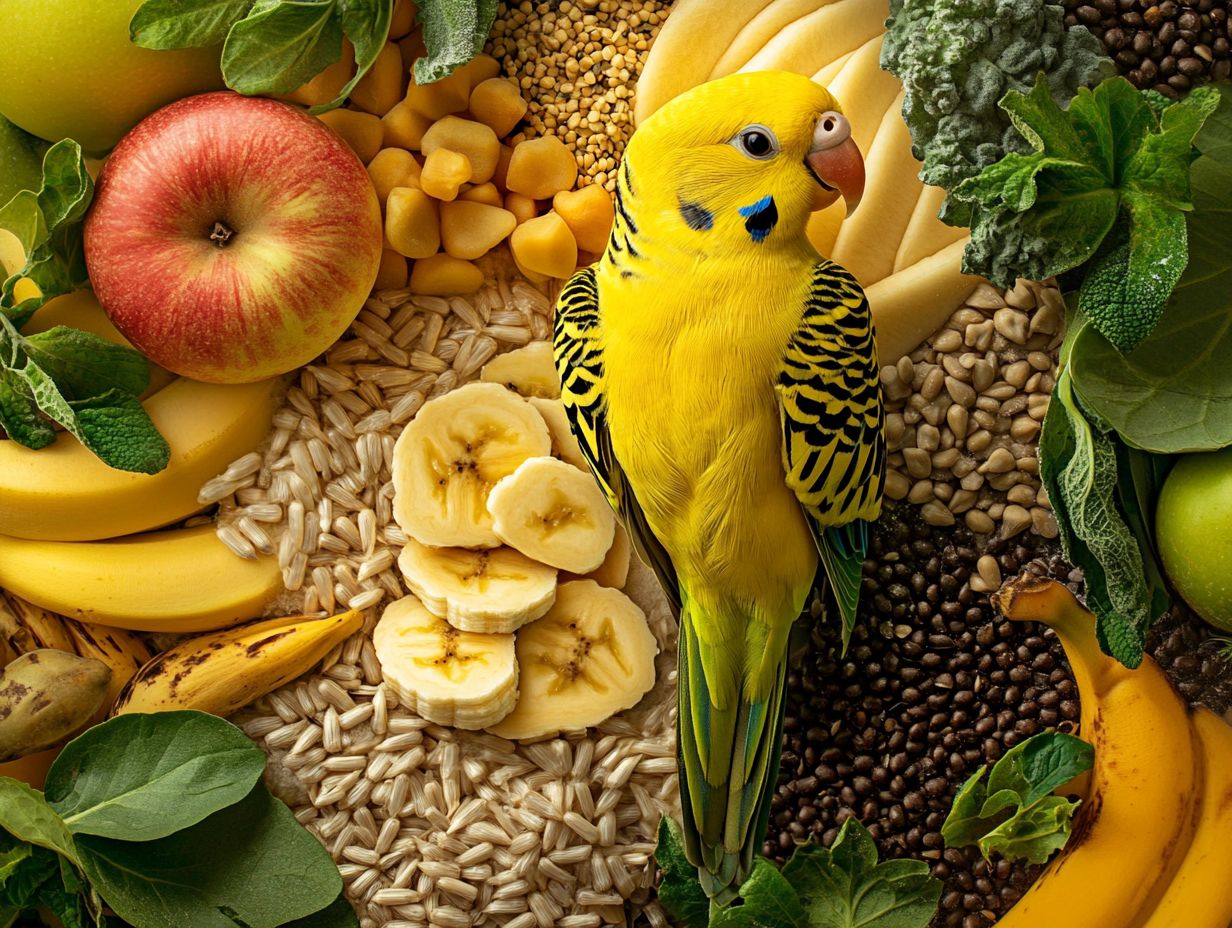
Pellets are an excellent choice for feeding pet birds. They provide a nutritionally balanced diet that ensures your feathered friends receive essential vitamins and minerals. As a discerning avian caregiver, selecting high-quality food is crucial, especially for species with specific diet needs.
Opting for premium pellet brands like ZuPreem, Harrison’s Bird Foods, and Roudybush can significantly elevate your bird’s diet. These brands deliver tailored nutrition that promotes vitality and overall wellness. By incorporating pellets into your bird’s feeding routine alongside fresh fruits and vegetables, you create a balanced diet that meets their nutritional needs while keeping mealtime exciting.
When transitioning to pellets, it s best to do so gradually. This allows your bird time to adjust and explore their preferences. This thoughtful approach ensures a seamless switch without adding unnecessary stress. By carefully introducing these high-quality options, you can nurture a happier and healthier avian companion, paving the way for years of joyful companionship.
5. Treats and Supplements
Treats and supplements are essential for enhancing your pet bird’s diet. They provide extra protein, vitamins, and minerals that contribute to their overall health and happiness. These tasty additions can also serve as enjoyable snacks tailored to their preferences. Think of items like nuts, yogurt, or even popcorn as delightful rewards while ensuring quality and safety are top priorities in their dietary choices.
Remember to enjoy treats in moderation for a happy, healthy bird! Incorporating safe options such as dried fruits, seeds, or specially formulated training treats can significantly reinforce positive behaviors. Additionally, considering the best food combinations for parrots along with nutritional supplements like omega fatty acids, which help maintain healthy feathers and skin, and probiotics can cater to specific health needs, ensuring a balanced diet for your feathered companion.
Paying attention to how your bird responds to these additions allows you to take a personalized approach. This not only promotes their physical well-being but also helps strengthen the bond between you and your avian friend.
What Should Be Avoided in a Pet Bird’s Diet?
Being aware of what to avoid in your pet bird’s diet is essential for ensuring their health and longevity. Certain foods can be toxic or harmful, leading to serious health issues and nutritional deficiencies. Common culprits include:
- Avocados
- Chocolate
- Seeds from apples and cherries
These foods can adversely affect your bird’s well-being, highlighting the importance of informed feeding practices. Take avocados, for instance; they can trigger respiratory distress and heart damage due to a compound called persin. Chocolate, with its theobromine content, poses a particular threat, potentially causing vomiting and seizures. Seeds from apples and cherries contain cyanide, posing a serious risk if consumed in large quantities.
To protect your feathered friend, it s crucial to diligently read labels, seeking out bird-safe ingredients. Stay informed about avian dietary needs through reputable sources. Act now to protect your feathered friend from these dangers! This proactive approach not only enhances the overall quality of your bird’s diet but also ensures they thrive in a safe and healthy environment.
How Much and How Often Should Pet Birds Be Fed?
Determining how much and how often to feed your pet birds is crucial for promoting healthy habits and ensuring they receive the optimal nutrition tailored to their specific species and needs. This can significantly influence their overall health and behavior. By establishing feeding schedules and portion sizes based on individual dietary requirements, you foster better growth and wellness in your companion birds.
For various species, daily feeding amounts can vary widely. For instance, small birds like canaries may need about a tablespoon of seeds, while larger parrots might require up to a cup of pellets and fresh produce. It’s essential to consider factors such as your bird’s age, activity level, and health conditions when adjusting these amounts. Fresh fruits and vegetables play a vital role in providing essential vitamins and minerals that pellets alone might lack.
Regularly monitoring your bird s eating habits not only helps ensure they are consuming a balanced diet but also allows you to spot any potential dietary deficiencies early, enabling timely interventions.
What Are Some Tips for Introducing New Foods to Pet Birds?
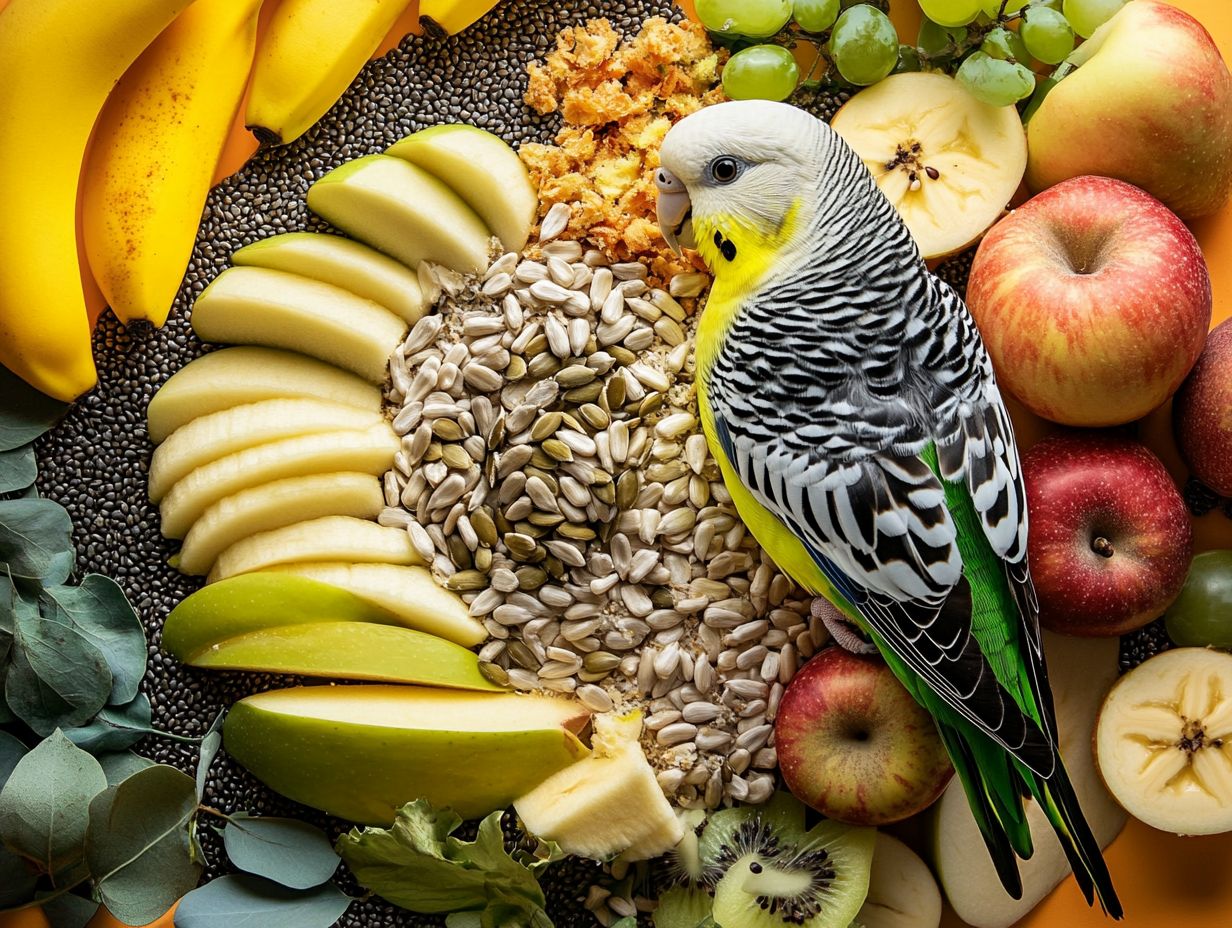
Introducing new foods to your pet bird can be a careful process. It can significantly impact their health and behavior.
It takes both patience and creativity to encourage them to explore and embrace a variety of dietary options. Gradually incorporating fresh fruits, vegetables, and healthy snacks can help ease the transition and spark their curiosity, ultimately leading to a more balanced diet.
To make this process smoother, consider mixing unfamiliar foods with their favorites. This combination creates a more appealing and less intimidating experience.
Experimenting with different preparation methods like steaming, chopping, or pureeing can showcase new textures and flavors that might pique their interest.
It’s essential to pay attention to their individual preferences, as each bird has its own unique likes and dislikes. Monitoring their reactions after you introduce a new food can offer valuable insights.
If your bird shows hesitation or turns away, it might be wise to try a different approach or revert to something they re more comfortable with before gradually reintroducing the new item.
How Can a Pet Bird’s Diet Affect Their Overall Health?
A pet bird’s diet profoundly influences its overall health, affecting everything from energy levels to longevity. Proper nutrition is the cornerstone of avian wellness, supporting the vital bodily functions necessary for optimal development.
By making informed feeding choices and offering a variety of suitable options, you can significantly enhance your feathered friend’s quality of life.
The connection between diet and health outcomes is clear in many aspects of your bird’s well-being. For example, specific nutrients play a vital role in feather quality, ensuring vibrant plumage and effective insulation.
Conversely, neglecting essential vitamins may result in dull feathers and excessive molting. Balanced nutrition is crucial for your bird’s behavior.
A diverse diet staves off boredom and encourages healthy interactions. A well-rounded diet strengthens the immune system, reducing the risk of illness and ensuring your bird thrives in its environment.
Incorporating fresh fruits, vegetables, and high-quality pellets will help keep your avian companion energetic and resilient against health challenges!
What Are Some Common Nutritional Deficiencies in Pet Birds?
Common nutritional deficiencies in pet birds can lead to significant health issues if you don’t identify and address them promptly. Many owners, unfortunately, remain unaware of the specific dietary needs that vary by species and individual preferences.
To maintain avian health and prevent long-term complications, ensuring a balanced diet rich in essential vitamins and minerals is paramount.
For instance, if your bird is lacking in vitamin A, you might notice dull plumage or respiratory issues. Similarly, insufficient calcium can weaken bones and create reproductive problems in females.
Recognizing these symptoms early is crucial. Signs like poor feather quality, lethargy, and abnormal droppings could indicate underlying deficiencies.
Make sure to include fresh fruits, leafy greens, and pellets that have added nutrients into their diet. Additionally, incorporating the top 10 nutritious seeds for your pet bird can keep their meals diverse, satisfying your feathered companions while supporting their overall well-being and enhancing their vibrancy.
Curious about how to keep your bird healthy? Act now to enhance your bird’s diet and prevent deficiencies!
How Can a Pet Bird’s Diet Change as They Age?
As your pet birds age, their dietary needs and preferences change. Adjusting their nutrition plan is essential for their health at every life stage.
Juvenile birds typically need higher protein levels to support their rapid growth and development. Adult birds gradually shift toward a more balanced diet. As they enter their senior years, their metabolism slows, making it crucial to carefully monitor and adjust protein levels.
Incorporating specific supplements, such as healthy fats or calcium, can help address potential deficiencies. Age affects their feeding habits; older birds may prefer softer foods and might require encouragement to eat.
Keep an eye on your bird’s appetite and behavior it s a fun way to stay connected! Changes may indicate underlying health issues that need your attention.
Frequently Asked Questions
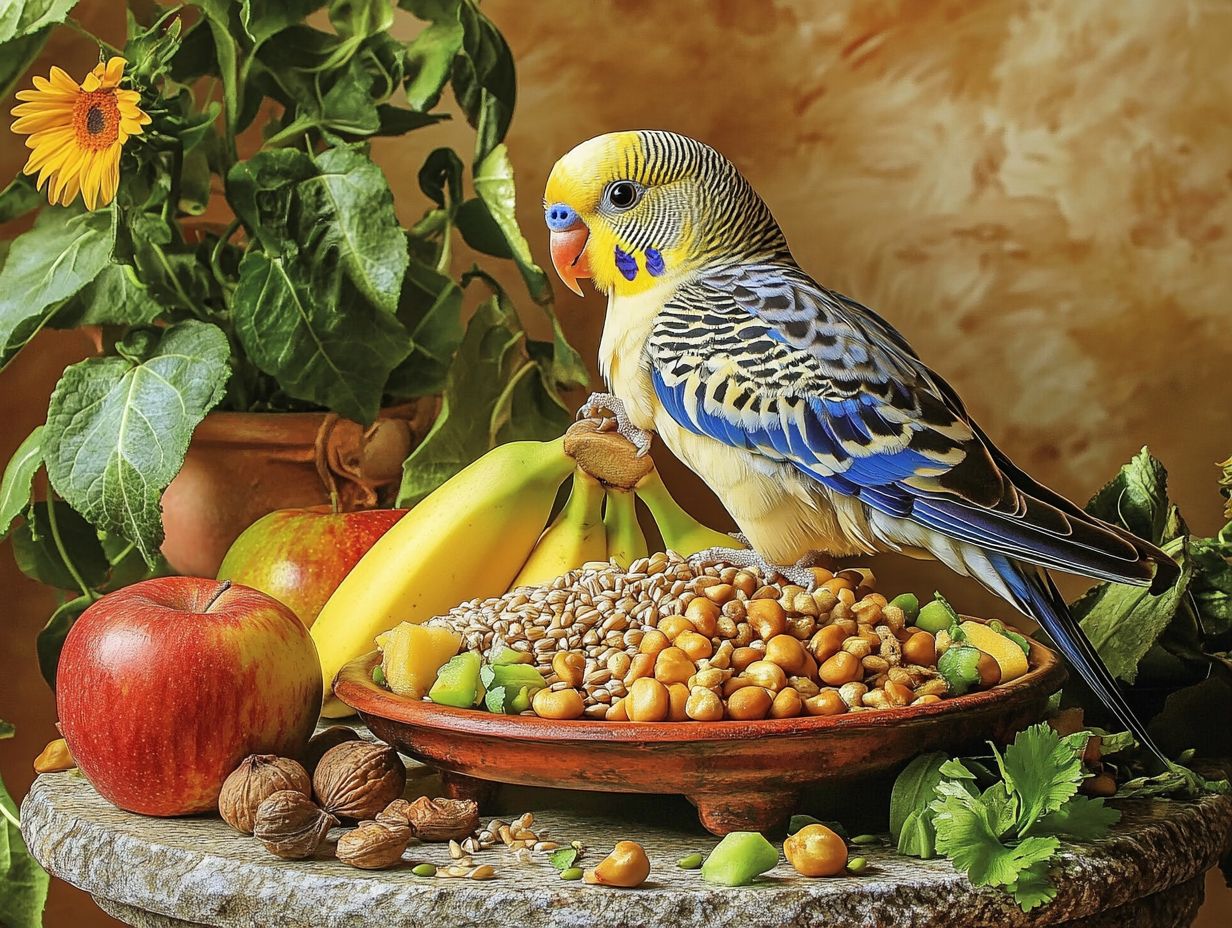
-
What are the top 5 favorite foods of pet birds?
The top 5 favorite foods of pet birds are seeds, fruits, vegetables, pellets, and nuts.
-
Do all pet birds have the same favorite foods?
No, just like humans, pet birds have individual preferences and may have different favorite foods.
-
Can I feed my pet bird human food as one of their favorite foods?
It is not recommended to feed your pet bird human food as it may not meet their nutritional needs and can be harmful to their health.
-
How can I introduce new foods to my pet bird’s diet?
Introduce new foods gradually and mix them with their current favorites. Be patient and persistent.
-
Are there any foods that pet birds should not eat?
Yes, there are foods that are toxic to pet birds, including avocado, caffeine, chocolate, and alcohol. Research and consult with a veterinarian before introducing any new food.
-
Should I offer my pet bird a variety of foods or stick to their top 5 favorites?
It is recommended to offer your pet bird a variety of foods to ensure a balanced diet and prevent boredom. Consider adding 5 yummy treats birds can’t resist to include their top favorite foods as well.


